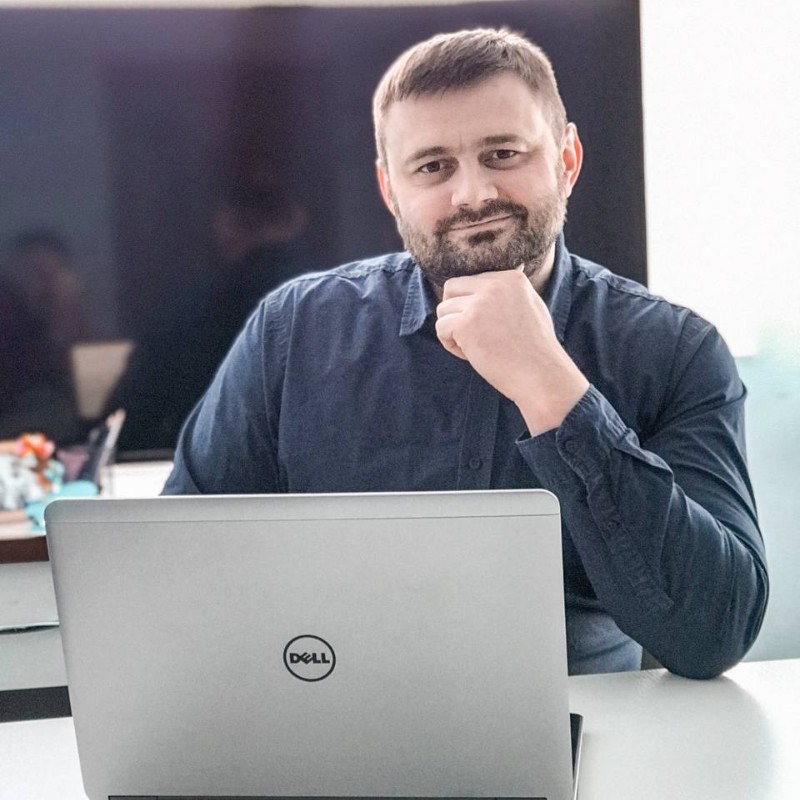Common myths about IT outsourcing to Ukraine: true or false? Interview with Vakoms CTO

One of the recent trends is asking AI chatbots various questions about people or their work, and we decided to join in. The full-scale war in Ukraine has generated some disturbing myths that scare our prospects and sometimes prevent them from contracting Ukrainian companies for their IT projects. So, we asked Gemini about the common myths on outsourcing software development to Ukraine, and the Vakoms managing partner and CTO, Andriy Shevchyk, has commented on them.

Myth: Ukraine only offers cheap, low-skilled labor (“code monkeys”).
Andriy: That’s definitely false. I believe this myth originates from the Soviet Union era, where the USSR technology was considered outdated and lagging behind Europe and the USA. It might have been valid to some extent, but nevertheless, there were aircraft, armored vehicles, etc. Maybe it was not the highest level, but still. After the USSR collapsed, technology started to improve. Universities at that time provided a high-quality education despite common stereotypes.
The education system gave a good base to our engineers, it would be unfair to downplay the role of universities. Then, the IT companies developed their R&D and raised their specialists independently. The graduates could start working and grow as specialists among the senior developers. In addition, the past hype over IT has come to an end. Currently, only real specialists stay with IT, you will hardly find a complete rookie in the industry.
Concerning Ukrainian outsourcing rates, I see a correlation between cost and quality. Like in any other industry, you get lower quality for a lower price and higher quality for a higher price. The same goes for any other country. Good skills are of approximately the same price everywhere. However, in Ukraine, the IT industry has some privileges, so our prices can be lower. Compare a 30% general tax and a 6% tax for the IT industry. It’s a huge difference and benefit for us, so we can have a more affordable and competitive price. It has nothing to do with the quality or skills.
Myth: There are significant communication barriers due to language and culture.
Andriy: This is a debatable question. In general, in Ukraine, there’s a communication gap due to the language barrier. However, it depends on the industry: in the IT sector, the situation is somewhat more optimistic. I’d say it’s the same as with skills: only true professionals and enthusiasts remain in software development. And these are specialists whose English is fluent.
Regarding Vakoms, since the beginning of our company, we have hired an English teacher as a staff member. They help our employees improve their language skills. This is a common practice among all other companies I know because this makes sense.
In terms of communication, we have project managers who ensure efficiency and understanding between the team members from our and the client’s side. Speaking about culture, of course, there are some differences between countries, but actually, it’s not at all critical for the IT sector. In fact, the more a person works in IT, the less significant the difference is: expertise removes the boundaries. Working with senior developers, you most likely won’t notice any cultural differences at all.
Myth: Ukrainian IT companies are only suitable for simple, repetitive tasks, not innovation or complex product development.
Andriy: Definitely false. Ukraine was one of the first countries to establish a Digital Agency whose sole purpose was to digitize the state. Ukraine was also the first to launch Diia, a mobile application with digitized versions of personal documents (ID, certifications, etc.). The Ukrainian state is focused on digital innovation, and our government greatly supports it.
At Vakoms, we’ve had multiple cases where our engineers brought innovation to the existing product. Let me give you an example. Say, a client has its development team, which has worked on the product for some time already. The team is doing great, and the client is satisfied. But here comes our engineer, who was involved in a different project every two years and learned different approaches, solutions, combinations of technologies, and so on.
Our specialist takes on the project and gives suggestions. For example, they might say: “This feature is working good, but we could do it better. I’ve worked on this before, and we got excellent results.” Or: “I’ve been working on a similar solution, and I suggest we do it like this. It would be beneficial in the long-term perspective.” The client may not trust at the beginning, but in most cases, they agree and invest in this new perspective because it does make sense.
Another point I can’t help but mention is the high-quality internet connection we have in Ukraine. For those who think Ukrainian technology is lagging, come to Ukraine from a European country, and you will feel a huge difference in the connection quality and speed. Historically, we missed the first wave of setting up the Internet, so when it came to us, we could use best practices and do everything right from the first try.
While some European countries are still using older systems with vintage modems, we have excellent coverage and new equipment. In Ukraine, the signal is often better than in Europe or the USA, and the war hasn’t affected it. I wouldn’t say it’s something about “lacking innovation” or “inability to develop complex projects.”
Myth: Outsourcing to Ukraine is unreliable and highly risky due to the full-scale war.
Andriy: That’s probably the biggest fear about development outsourcing in Ukraine today. It’s understandable, but let me comment on it. First of all, for 3 years of the full-scale war, we did not have a single case where we couldn’t deliver the result in time due to a war-related reason. We all adapted to the uncertain environment, and we work hard like before. I’ll enumerate several factors that allow us to stay resilient.
At Vakoms, our policy doesn’t require work from office. On the contrary, we encourage our employees to stay distributed and take care of their safety.
Our air defence and notification systems are working properly, so during the attacks, nobody is panicking, and everyone knows what to do and how to protect themselves.
We adapted our infrastructure for all possible outages: in our Ukrainian office, we have a powerful diesel generator to provide electricity in case of an emergency.
We have a huge concrete shelter where employees can take cover in case of a massive missile attack. We even set up an internet connection here so our engineers can continue working in a safe environment in case the air raid takes a long time.
Every employee has equipped their remote workplace with a fiber-optic internet connection and a power station that allows continue working if the electricity cuts off.
Our repos and servers are outside of Ukraine, so the code and backups are in a safer location.
The combination of all these factors, plus Ukrainian diligence, makes us invulnerable to missile attacks, which are the main danger here in Lviv, far from the front line.
Myth: Data security is weak, especially in the current environment.
Andriy: That’s not true. The myth originates from the Cold War, I guess. Back then, Europe had no trust in the countries behind the Iron Curtain. It’s not that bad in Ukraine, but I won’t deny that the copyright regulations are stronger in Europe or the USA.
I spoke to clients, and they said they’ll feel safer if we don’t keep the documentation in Ukraine. Well, it is said: we keep important and sensitive data outside of Ukraine, so it’s under European protection.
In addition, Vakoms is ISO 27001 certified and is working on further certifications. I believe that would give our current and future clients peace of mind that their data is managed properly now and will be protected further.
Each case is individual, some fears are worsened by the old stereotypes that have nothing to do with modern reality. We communicate with the clients, explain the situation, and find a way out. Summing up, I’d say, the times are not easy, but we find workarounds.
Myth: There is a tech talent shortage
Andriy: That’s false. The myth comes from the post-COVID times, with so many projects that we could hardly hire a person. It was a crazy boom, projects and startups everywhere. But now it’s gone. The global market has dipped, and there’s no past abundance of projects. Still, the engineers remained, so now there’s no talent shortage whatsoever.
Myth: Customers have abandoned Ukraine
Andriy: If we talk about the war, it highly depends on the company’s location. I cannot speak for all companies, especially those from locations closer to the front line.
We’re in Lviv, in Western Ukraine, far from the combat zone. The biggest danger here is missile attacks, but they are significantly less frequent compared to Eastern regions, and our air defence protects us well. So our region is really safer. Some companies also moved from East to West because it makes sense. They continue working here.
Regarding Vakoms, when the war broke out, I talked to every client to communicate that we were covered as much as possible. We had backups and tried to anticipate as many scenarios as possible. And if clients weren’t directly supporting Russia, they stayed with us. So I don’t agree with the statement, but I know things may differ for other companies.
Bottom line
These were the most common myths and stereotypes about IT outsourcing in Ukraine from the perspective of Vakoms’ managing partner and CTO, Andriy. As we see, sometimes stereotypes can outlive their reality and continue embarrassing people. Even though the reality is completely different from the one where these myths could make sense.




